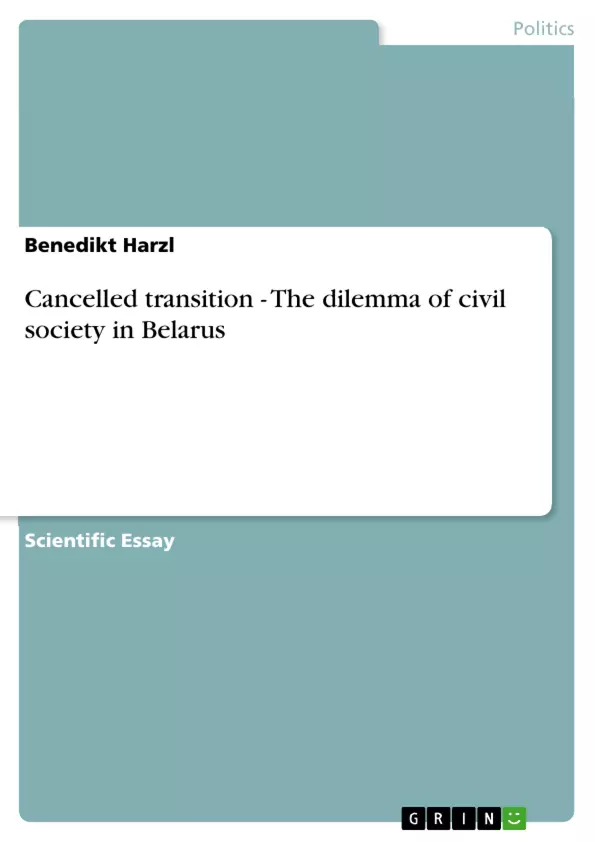The fact that demonstrations and street rallies in Belarus are only modestly attended
witness that the extent of European and American criticism seems to be more virulent than
the domestic resistance against the state authorities. As a matter of fact, in the 14th year
of Lukashenko’s presidency we have to ask ourselves why the level of civil disobedience
still remains very low. One assessment in this regard is beyond question: The argument of
the “people’s fear of the authorities” doesn’t serve any longer as the sole means of
explanation. The reasons for the longevity of this authoritarian regime in the heart of
Europe are cross-linked: On the one hand, the historical weakness and the reluctance of
the domestic political elite to accept independence in 1991 are very often brought into the
discussion. Apart from this, also Russian economic support made it possible for Belarus to
navigate itself into a deadlock in its relations with the EU. There may be other reasons
which can explain the contemporary situation of a political cul-de-sac. However, the EU
decision makers would be well advised to deal with two subjects: First of all, they should
seriously consider how much influence they really have over this awkward country and
secondly, they should – based on the first consideration – come to reasonable decisions.
The imposition of visa bans altogether with the conditional approach of EU rapprochement
will not enhance the chances of democratization for Belarus. This “strategy” will have the
opposite of the intended effect and provides the authorities with new tools to accuse the
opposition of anti-Belarusian behavior.
Inhaltsverzeichnis (Table of Contents)
- Introduction
- Civil Society: Requirement for Transition
- Civil Society in Eastern Europe
- Civil Society in Belarus
- Civil Society and Identity in Belarus
- Some Political and Economic Aspects of Civil Society in Belarus
Zielsetzung und Themenschwerpunkte (Objectives and Key Themes)
This text examines the development and challenges of civil society in Belarus, particularly in the context of the country’s transition from an authoritarian regime. It explores the role of civil society in democratization and its importance in fostering a democratic culture, while recognizing the complexities of the post-Soviet transition.
- The role of civil society in democratization
- The challenges faced by civil society in Belarus
- The historical context of civil society in Eastern Europe
- The relationship between civil society and identity in Belarus
- The impact of political and economic factors on civil society in Belarus
Zusammenfassung der Kapitel (Chapter Summaries)
- Introduction: This chapter introduces the central argument that civil society in Belarus is a critical factor in the country’s transition from authoritarianism, yet its development is fraught with challenges. The chapter also highlights the complexities of the Belarusian situation, linking it to historical and political factors.
- Civil Society: Requirement for Transition: This chapter elaborates on the importance of civil society in fostering democratic values and the consolidation of democracy. It explores different perspectives on the relationship between civil society and the state, acknowledging both the potential for positive change and the potential for conflict.
- Civil Society in Eastern Europe: This chapter delves into the historical context of civil society in Eastern Europe, analyzing its role in challenging the Communist regime and its evolution in the post-Soviet era. It highlights the transition from a state-controlled economy to a market-oriented framework and the challenges of establishing a vibrant civil society in the region.
- Civil Society in Belarus: This chapter examines the specific situation of civil society in Belarus, analyzing its development and the challenges it faces in an authoritarian context. It explores the factors hindering civil society's growth and its relationship with the state and political elite.
- Civil Society and Identity in Belarus: This chapter investigates the connections between civil society and the construction of national identity in Belarus. It explores how civil society actors navigate the complex and evolving national identity discourse in the country.
- Some Political and Economic Aspects of Civil Society in Belarus: This chapter delves into the political and economic context influencing civil society in Belarus. It analyzes the role of the state, political parties, and economic factors in shaping the landscape of civil society.
Schlüsselwörter (Keywords)
The main keywords and focus topics of the text include civil society, transition, democratization, Belarus, authoritarianism, Eastern Europe, post-Soviet, identity, politics, and economics. The work explores the multifaceted nature of civil society in Belarus, examining its historical context, its role in democratization, its challenges in an authoritarian environment, and its connection to the formation of national identity.
- Citar trabajo
- Mag. Benedikt Harzl (Autor), 2008, Cancelled transition - The dilemma of civil society in Belarus, Múnich, GRIN Verlag, https://www.grin.com/document/112385



